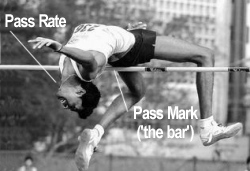 Justin Wood, the Today programme’s Useful Idiot, was let out of his play-pen this morning to tackle a story with real numbers in it. He promptly crashed and burnt. So spectacular was the crash and burn that the erudite Prof McManus’ erudition flat-lined and later all but crashed and burnt too. At issue was the distinction between pass mark and pass rate for the Professional and Linguistic Assessments Board test used to assess clinical and English language skills in the – as the media would have it – foreign devils more formally known for the time being as International Medical Graduates. In Woodie’s upside down world, the great secret was to up the pass rate, the better to weed out those with forked tongues. In the real world, of course, upping the pass rate, rather than the pass mark, would have the effect of letting though not fewer but more IMGs.
Justin Wood, the Today programme’s Useful Idiot, was let out of his play-pen this morning to tackle a story with real numbers in it. He promptly crashed and burnt. So spectacular was the crash and burn that the erudite Prof McManus’ erudition flat-lined and later all but crashed and burnt too. At issue was the distinction between pass mark and pass rate for the Professional and Linguistic Assessments Board test used to assess clinical and English language skills in the – as the media would have it – foreign devils more formally known for the time being as International Medical Graduates. In Woodie’s upside down world, the great secret was to up the pass rate, the better to weed out those with forked tongues. In the real world, of course, upping the pass rate, rather than the pass mark, would have the effect of letting though not fewer but more IMGs.
Six hours before the Today programme went live, a national rag not always known for its love of foreign devils published the same story, along with a linked editorial. Both the news item and the editorial made the same mistake. The news item reported McManus’ study ‘called for the pass rate of the competency exam to be raised from 63 to 76 per cent’ while the editorial treated the terms pass mark and pass rate as interchangeable: the header cried ‘the pass mark that enables foreign-trained doctors to work in Britain should be raised immediately’ and then blew it a few lines later: ‘But this test is too easy, according to the UCL researchers, who say its pass rate should be raised from 63 per cent to 76 per cent…’.
Whether Woodie spends too much time reading the Telegraph we shall probably never know. What we can be more sure about is that neither the BBC nor the Telegraph bothered to read the open access BMJ article, which clearly says ‘the pass mark would need to be moved from its present level of about 63% to about 76%’.
The Telegraph editorial is titled ‘The NHS must raise the bar for foreign doctors’. That may or may not be the case – Dr No is not entering that particular fray today – but what he can say is that both the Telegraph and the BBC need to raise the bar on their linguistic skills. To report and in the Telegraph’s case advocate for a change that is the opposite of that actually reported in the study is sloppy to say the least; not to spot that raising a pass rate means passing more candidates suggests a grip on meaning about as tight as a clapped out jockstrap. Time, perhaps, for the media to introduce a Professional and Linguistic Assessment test for its members – and make sure it gets the bar – the pass mark – right.
